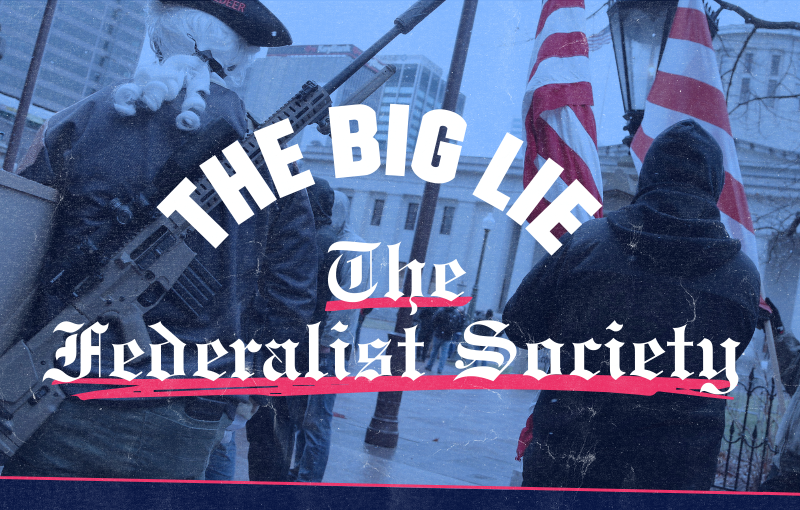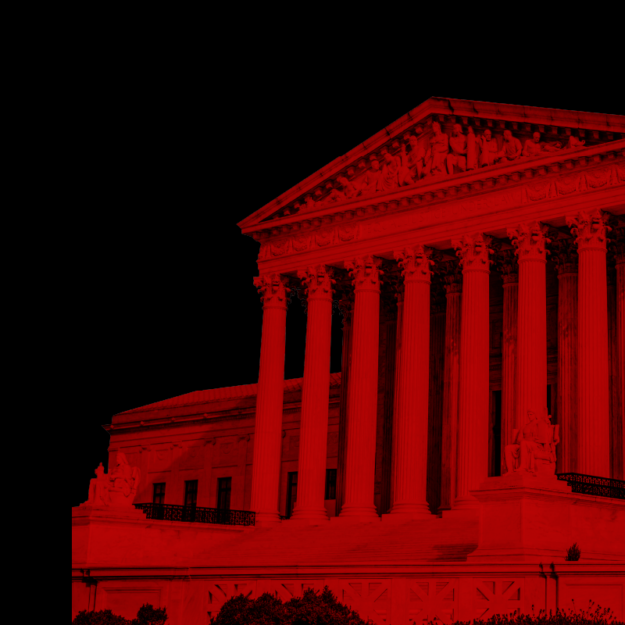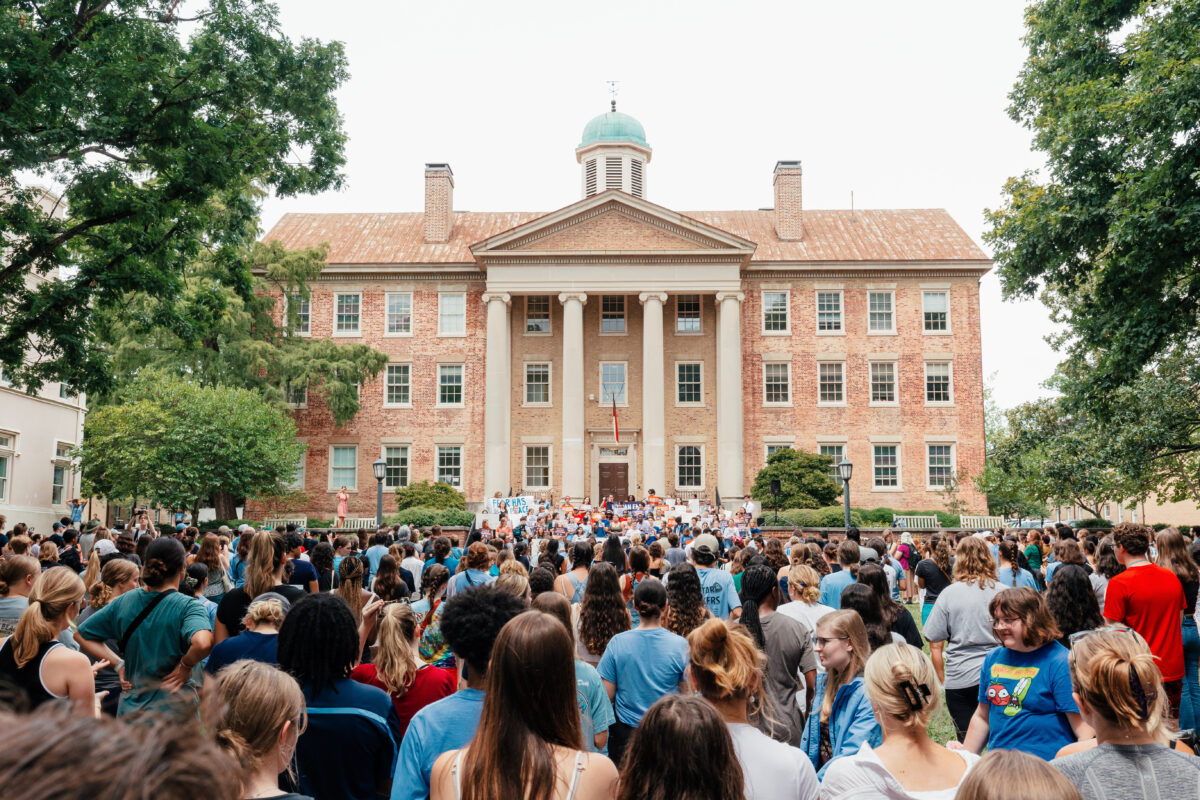- Blog
THE BIG LIE: THE FEDERALIST SOCIETY
Share

In this series, our Judicial Advocacy team is breaking down the Big Lies that the gun industry has been telling us that helps them fuel the gun violence epidemic, and their profits.
By Tyren Boyd, Judicial Advocacy Associate
It’s no secret: the Supreme Court has morphed in the last few decades into an arch-conservative court where progressive, popular, and commonsense laws have often gone to die. From the end of Roe v. Wade, to a fundamental shift in how the courts have interpreted the second amendment, the court seems to have—almost all of the sudden—turned on a dime to roll back the rights we’ve worked so hard for. But it didn’t happen overnight. Behind this shift is a sometimes secretive national powerhouse working for decades to build a pipeline of conservative legal scholars and place them in the court system: The Federalist Society. For those of us in the gun safety movement, getting to know this powerful group is key to help build up our response, and protect gun safety laws.
The Society’s ties to the Supreme Court are extensive: five of the current nine justices on the Supreme Court are either current or past members, and many more in the lower courts are too. And their power is only set to grow under a second Trump administration. For decades, Republicans have looked to the Federalist Society’s ranks for judicial appointments, and under Trump’s first term, Trump all but outsourced his appointments to them. They’re aligned in a particular—and dangerous—way of applying the constitution called originalism, the idea that the constitution should be interpreted solely based on the intent of its framers in 1787. Seems reasonable, but it raises a fundamental question: who is interpreting that intent? And what about the ways society has fundamentally changed in the 250 years since? This vision has deadly consequences.
Gun rights provide a striking example: the Second Amendment was historically understood as a collective right related to militia service, yet the 2008 District of Columbia v. Heller decision, strongly influenced by the Society’s originalist philosophy, redefined it as an individual right. This is an interpretation of the founders intent, yes. But it’s actually a new interpretation. It broadened gun rights in a way that simply hadn’t been done for centuries, and disregards the original context of the constitution or the way a modern AR-15 is fundamentally different from an 18th century musket. In 2021 alone, gun violence killed over 45,000 people in the US, underscoring the deadly consequences of this judicial interpretation.
On the Supreme Court
5 of 9
Justices are linked to the Federalist Society
This same philosophy eviscerated Roe v. Wade in 2022, marking the first time the Court revoked a longstanding right, all in service of this regressive judicial philosophy. It ended the Chevron deference, sharply curbing federal agencies’ regulatories powers. And in NYSRPA v Bruen, it laid bare the precise dangers ahead, by striking down a gun safety law because the justices cherrypicked history to almost arbitrarily decide that there is no historic context for a gun law. These are the very kinds of decisions that arch conservatives have been frothing at the mouth for for decades, and it’s proof that their efforts to buy and influence the courts are paying off, and the Federalist Society has been key to that effort.
Leonard Leo, a pivotal figure in the Federalist Society, has played a major role in securing and channeling resources to support and turbocharge this conservative judicial agenda. In 2023, Leo’s network received a record-breaking $1.6 billion donation from conservative donors, positioning the organization to influence the judicial appointment process on an unprecedented scale. While the Society itself cannot make direct donations due to its tax-exempt status, Leo’s connections enable a network of affiliated groups to fund campaigns, legal battles, and advocacy projects, often on behalf of judicial candidates or policies that align with the Society’s ideals, and he’s been instrumental in naming judges to US courts.

This influence extends into state-level judicial races as well, where the Federalist Society’s funding—often described as “dark money” due to its undisclosed sources—has reshaped the political landscape of judicial elections. In Wisconsin’s 2023 Supreme Court election, for example, conservative donors contributed over $45 million, largely from dark money sources, in a record-breaking effort to sway the court’s composition. This kind of investment in state courts gives affluent donors substantial influence over state-level rulings on crucial issues such as labor laws, public safety, and electoral regulations. As judicial races increasingly resemble partisan political campaigns, the presence of dark money skews judicial independence, often pushing rulings toward conservative outcomes that align with the Federalist Society’s ideological priorities.
Despite substantial influence, the Federalist Society’s power is not absolute, of course. But the Society’s power relies in part on public disengagement. The more people tune out, the easier it is for them to force through their appointments, and the easier far-right justices can make dangerous and unpopular decisions without consequence. Now is the time to act. You don’t need to be a lawyer or a politician to make a difference; being informed and involved is enough. Here’s how you can take action:
- Knowledge is Power: Understand how court rulings affect your life and how special interest groups like the Federalist Society shape the legal system.
- Vote in Every Election: State and local judicial elections matter. Your vote can help maintain a judiciary that focuses on justice rather than political agendas.
- Support Advocacy Groups: Join organizations that work to balance the influence of the Federalist Society. Every effort counts.
The Constitution should reflect the needs of today’s society. By staying informed and active, we can build a judiciary that works for everyone, not just the privileged few. Let’s take the courts back, friends!
